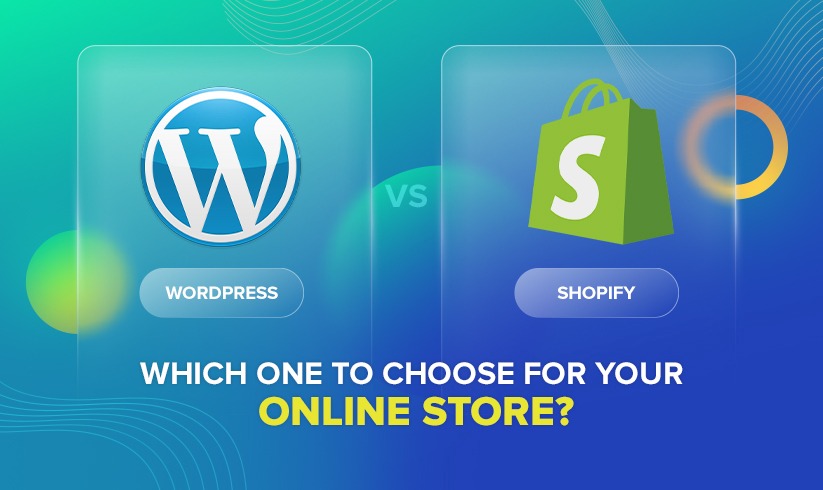WordPress vs Shopify: Which One to Choose for Your Online Store?
- April 12, 2024
- Post By: Inter Smart's Content Team

Are you in search of the best e-commerce platform for your online store? Without any doubt, you might have come across the names WordPress and Shopify. Get out of your dilemma, because we are here to help! Read this article on WordPress vs Shopify: Which One to Choose for Your Online Store for a better idea of the two.
When comparing both options, Shopify is the all-around winner for sales-focused businesses that need full-featured, easy-to-use, and automated e-commerce. WordPress takes time to get used to, but it is the hands-down champion when it comes to versatility.
Let’s take a quick look at both e-commerce platforms, their advantages, and the disadvantages that we need to consider before choosing either of them.
Shopify: For Sales-Focused Businesses
Shopify is known as a dedicated e-commerce platform which means that its primary focus is supporting your online sales. Every single thing about Shopify is built to help businesses run an e-commerce business efficiently.
Benefits of Shopify
Shopify helps small businesses and startups to quickly build, launch, and run an e-commerce business with very little effort. Every tool that you will need is built into the platform, which includes:
- Built-in payments with Shopify payments
- Product data, inventory, and collection management tools
- Quick-start online store designing wizard
- Integrations for print-on-demand suppliers and dropship vendors
- Social selling on Instagram and Facebook Shops
- Multi-Channel marketplace selling on eBay and Amazon
- Built-in marketing tools for email, Facebook ads, and abandoned cart recovery
- In-store and In-person sales using Shopify POS
- 24/7 customer service for you to troubleshoot issues or help you get set up
Drawbacks of Shopify
As your website technically lives on Shopify’s e-commerce platform, you will always be stuck with some things, like monthly and per-transaction fees, Shopify’s weak blogging features, and some of its other limitations.
- Limited features: Even though you can extend store capabilities through Shopify apps, these will add costs to your monthly totals.
- Monthly costs: Shopify websites cost $29, $79, and $299 per month based on your business needs. The 14-day trial helps you to test-drive and explore Shopify risk-free.
- Transaction fees: If you are not using Shopify Payments to process payments, then you will have to pay an added fee per sale of 0.5%, 1%, or 2% depending on your monthly plan.
- Blogging features: Shopify provides a blog with every store, but content creation, display options, and management are very limited compared to WordPress.
WordPress: For Businesses wanting Versatility
WordPress is a content management platform that can be turned into and used as any type of website. You can create any kind of website that you dream of. You can build a news and media website, educational portal, influencer blog, or an online storefront like Shopify’s e-commerce platform, and much more. Several sales capabilities can be added with the use of an e-commerce plugin.
Benefits of WordPress
WordPress’s hallmark is its adaptable nature. It allows you to build a content-based website made up of pages, videos, images, and blog posts on its own. You can also expand it with the help of plugins that add all kinds of functionalities to any WordPress website.
- Build an online store with a strong, full-featured, single-user, or multi-user blog.
- Add traffic-driving features like video channels and online forums to an online store
- Enable blog-based commerce to sell items directly from your blog posts.
- Turn any existing WordPress website or blog into an online store
- Combine physical product sales and affiliate income within one website
- Sell both digital items via download and physical items that ship
- Sell products through print-on-demand suppliers and dropship vendors
- Sell memberships or access to members-only content or educational portals
- Market events, take reservations, and sell tickets online or through downloads
- Offer guest posting or partner advertising for additional income
- Market local services, take bookings online, and acquire prepayments or deposits
As you might have noticed, some of Shopify’s features such as built-in payments, a quick-start website, social selling, in-person sales, and a marketplace did not add to this list. But that does not mean WordPress does not have such features, in fact, they are available. But unlike Shopify, they are not built into every e-commerce plugin. You have to choose one that delivers the sales features you are looking for and finding the perfect solution is no easy task.
Drawbacks of WordPress
The versatility of this platform also makes it a challenging platform to set up and maintain when compared to Shopify.
- Varying Costs: WordPress is free, and so are some of the top-rated e-commerce plugins. However, a good theme, monthly hosting, and other plugins can add costs to your website. You can launch a WordPress online store for just the cost of hosting, for just $6.95 per month with Bluehost. However, the sellers will eventually need plugins for extended capabilities.
- Many moving parts: WordPress has many moving parts when compared to Shopify which is an all-in-one system. You will have to select hosting for your WordPress website, then install an e-commerce plugin, choose an e-commerce WordPress theme, and then install additional plugins for marketing, SEO, and other functionalities.
- Little support: WordPress hosting services like GoDaddy, Bluehost, and WP Engine can help you with the initial WordPress setup and hosting. Store themes, e-commerce plugins, and other plugins are supported by various companies that make them. Most of the support is via email, online forums, or support tickets. Shopify provides far more hands-on help in this area.
- Security is in your hand: Unlike Shopify, which has its own secure servers, you have to make sure that your WordPress store is safe and secure via SSL (Secure Sockets Layer) encryption. This is handled by the hosting provider and is included in WordPress e-commerce hosting packages.
- Ongoing maintenance: Every element of your WordPress website will need regular updates, that includes WordPress itself, your e-commerce plugin, other plugins, and the website theme. Even though these are automated, updates and adding plugins can be a cause for occasional conflict.
With the help of this quick overview on WordPress vs Shopify, we can clearly see that Shopify is the clear winner of the two for its ease of use, while WordPress is the overall champion for versatility.
Get in touch with the best web development company in Dubai, Intersmart Solutions for out-of-the-box e-commerce solutions for your business. We have experienced professionals who can offer you 24/7 help and support. Our dealings are transparent, safe, and secure. Contact us today for our e-commerce development services.
Get A Call back from Our Expert
Need tailored guidance or have specific questions? Simply request a callback, and one of our knowledgeable experts will reach out to you at a time that suits your schedule.
Marketing
Services





